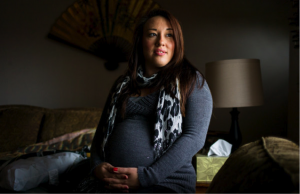PJW Note: This post originally appeared on October 28, 2013. Yet, as a recent Op-ed in The New York Times, “Pregnant, and No Civil Rights,” clearly demonstrates, the problems Reiheld addresses have only gotten worse. With over 2,000 hits in the past three days, her argument clearly resonates with many of us confronting in the current political climate in the U.S. I move to the top for the attention of any readers who missed it the first time around, or for any who would simply like to be refreshed with a clear argument undercutting so much recent pregnancy legislation.
Alicia Beltran is 28. As Erick Eckholm of The New York Times reports, Beltran was taken from her home in handcuffs, having honestly answered a prenatal visit question about addiction by mentioning her previous struggle with a pill addiction. Urine tests proved she was not using the pills, yet she was taken before a family court commissioner. She asked for a lawyer, was ignored, and was told that the court had already appointed a legal guardian for the fetus. Despite being in recovery, she was ordered to spend 78 days in a drug treatment center against her will. She lives in Wisconsin, one of four states with laws that give authorities the, well, authority to confine pregnant women for substance abuse on the grounds that they would otherwise harm the fetuses they carry. These states—Wisconsin, Minnesota, Oklahoma, and South Dakota—are part of a disturbing trend of state laws which treat women less as citizens with full legal and moral rights, and more as humanoid fetal containers for the course of the pregnancy.
“This is what happens when laws give officials the authority to treat fertilized eggs, embryos and fetuses as if they are already completely separate from the pregnant woman,” said Lynn M. Paltrow, executive director of National Advocates for Pregnant Women in New York, of Ms. Beltran’s arrest and confinement.



